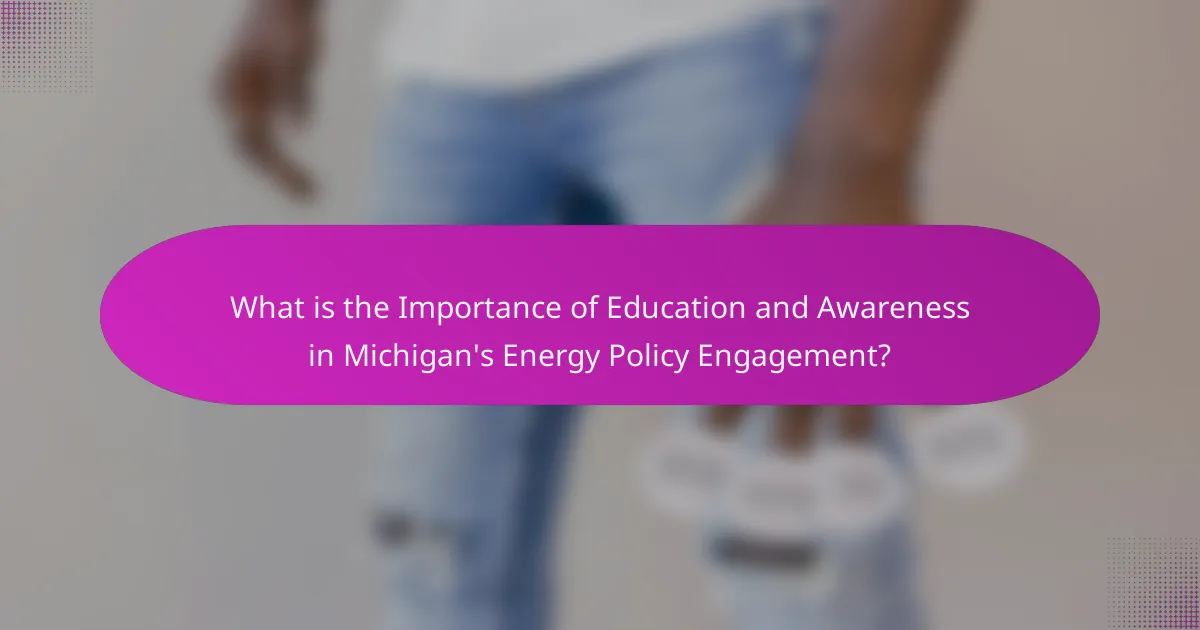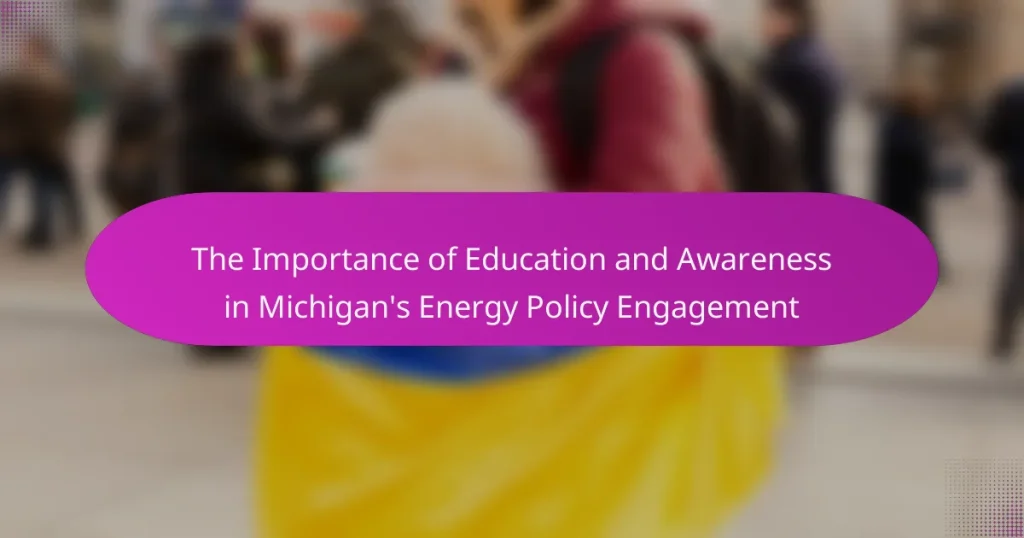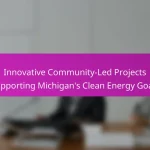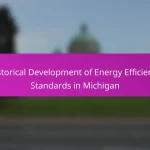
What is the Importance of Education and Awareness in Michigan’s Energy Policy Engagement?
Education and awareness are crucial in Michigan’s energy policy engagement. They empower citizens to understand energy issues. Informed individuals can advocate for sustainable practices. Awareness fosters participation in public discussions and decision-making. Education helps clarify the implications of energy policies on the environment and economy. Studies show that informed communities can influence policy outcomes effectively. Increased awareness can lead to greater support for renewable energy initiatives. This engagement ultimately shapes a more sustainable energy future for Michigan.
How does education influence public understanding of energy policies in Michigan?
Education significantly enhances public understanding of energy policies in Michigan. It equips individuals with knowledge about energy sources, sustainability, and policy implications. Programs and initiatives aimed at educating the public can clarify complex energy issues. For instance, community workshops and school curricula provide insights into renewable energy and conservation efforts. Research by the Michigan Energy Office indicates that informed citizens are more likely to support effective energy policies. Furthermore, education fosters critical thinking, enabling residents to engage in discussions about energy solutions. Ultimately, a well-informed public can advocate for policies that promote sustainable energy practices.
What are the key educational initiatives aimed at energy policy awareness?
Key educational initiatives aimed at energy policy awareness include the Michigan Energy Education Program and the Energy Efficiency Education Initiative. The Michigan Energy Education Program provides resources for teachers to integrate energy topics into their curriculum. This initiative reaches over 1,000 educators annually, impacting thousands of students. The Energy Efficiency Education Initiative focuses on community workshops and online resources. It aims to inform residents about energy-saving practices and policy implications. These initiatives are supported by state agencies and local organizations. They foster a better understanding of energy policies among citizens. Increased awareness leads to more informed public participation in energy policy discussions.
How do these initiatives impact community engagement?
These initiatives enhance community engagement by fostering awareness and participation in energy policy. They provide educational resources that inform residents about energy issues. Increased knowledge leads to more informed public discussions. This, in turn, encourages community members to voice their opinions. Engaged citizens are more likely to collaborate on energy solutions. Research indicates that informed communities are more proactive in policy advocacy. For instance, initiatives in Michigan have resulted in higher attendance at public forums. This demonstrates a direct correlation between education efforts and community involvement.
Why is awareness critical for effective energy policy engagement?
Awareness is critical for effective energy policy engagement because it empowers individuals to understand energy issues. Informed citizens can advocate for sustainable practices and policies. Awareness facilitates public participation in decision-making processes. It also helps stakeholders identify the implications of energy policies on their communities. For example, studies show that communities with higher awareness levels actively participate in energy discussions. This participation can lead to more effective and representative energy policies. Additionally, awareness encourages transparency and accountability in energy governance. Overall, increased awareness leads to better-informed choices and stronger advocacy for energy solutions.
What role does public awareness play in shaping energy policy decisions?
Public awareness significantly influences energy policy decisions. It shapes public opinion, which policymakers consider when creating regulations. Increased awareness leads to a more informed electorate. Informed citizens advocate for sustainable energy practices. According to a 2020 survey by the Michigan Energy Office, 75% of residents support renewable energy initiatives. This support pressures policymakers to prioritize clean energy in legislation. Furthermore, public awareness campaigns can highlight energy efficiency benefits. These campaigns often lead to increased participation in energy-saving programs. Overall, public awareness is crucial for driving energy policy towards sustainability.
How can increased awareness lead to better energy practices among residents?
Increased awareness can lead to better energy practices among residents by informing them about energy conservation methods. When residents understand the benefits of reducing energy consumption, they are more likely to adopt sustainable behaviors. Educational programs can highlight the financial savings associated with energy-efficient appliances. Awareness campaigns can also showcase the environmental impact of high energy usage. Studies show that informed residents reduce their energy use by an average of 15%. Furthermore, awareness of local energy policies can encourage community participation in energy initiatives. This engagement fosters a culture of sustainability within neighborhoods. Overall, increased awareness directly correlates with improved energy practices among residents.
What challenges exist in educating the public about energy policies?
Public education about energy policies faces several challenges. One major challenge is the complexity of energy systems. Many energy policies involve technical details that are difficult for the average person to understand. This complexity can lead to confusion and misinformation.
Another challenge is the lack of engagement from the public. Many individuals may not see energy policies as relevant to their daily lives. This disinterest can result in low participation in discussions or initiatives related to energy policy.
Additionally, there is often a gap in accessible information. Not all communities have equal access to educational resources about energy policies. This disparity can leave some populations uninformed.
Finally, political polarization can hinder effective communication. Different political views may affect how energy policies are perceived and discussed. This can create barriers to a unified understanding of energy issues.
What misconceptions do people have about energy policies in Michigan?
Many misconceptions exist about energy policies in Michigan. One common belief is that renewable energy sources are not prioritized in state policy. In reality, Michigan has set ambitious goals for renewable energy, aiming for 50% by 2030. Another misconception is that energy policies do not consider consumer costs. In fact, policies are designed to balance energy affordability with sustainability. Some people think that energy efficiency programs are ineffective. However, studies show that these programs have saved consumers millions on their utility bills. Additionally, there is a belief that the state does not support low-income households in energy access. Michigan has implemented programs specifically targeting assistance for low-income residents. Overall, these misconceptions can lead to misunderstandings about the state’s commitment to a sustainable and equitable energy future.
How can these misconceptions be addressed through educational programs?
Educational programs can effectively address misconceptions by providing accurate information and fostering critical thinking. These programs can include workshops, seminars, and online courses focused on energy policies. They should target specific misconceptions prevalent in communities. Engaging local experts can enhance credibility and relevance. Interactive elements, such as Q&A sessions, can encourage dialogue and clarify doubts. Furthermore, utilizing data and case studies can illustrate the real impacts of energy policies. Research shows that informed communities are more likely to participate in policy discussions. This participation leads to better understanding and acceptance of energy initiatives.
How can stakeholders improve education and awareness efforts?
Stakeholders can improve education and awareness efforts by enhancing collaboration with local communities. Engaging community leaders can help tailor educational initiatives to specific needs. Providing accessible information through workshops and seminars can increase public understanding. Utilizing digital platforms for outreach can broaden the audience reach significantly. Partnering with educational institutions can integrate energy policy into curriculums. Sharing success stories and case studies can illustrate the benefits of energy policies. Implementing feedback mechanisms can help stakeholders adapt their strategies effectively. Research shows that informed communities are more likely to participate in energy policy discussions, leading to better engagement outcomes.
What strategies can be implemented to enhance community involvement in energy policy?
Enhancing community involvement in energy policy can be achieved through several strategies. First, educational programs can be implemented to inform residents about energy issues. These programs should focus on the benefits of renewable energy and energy efficiency. Workshops and seminars can facilitate discussions between policymakers and community members.
Second, creating platforms for community feedback is essential. Online surveys and town hall meetings can gather public opinions on energy initiatives. This engagement fosters a sense of ownership among residents.
Third, partnerships with local organizations can amplify outreach efforts. Collaborating with schools, non-profits, and businesses can spread awareness more effectively.
Finally, incentivizing participation through grants or subsidies can motivate community members to engage in energy projects. Research shows that communities with active participation in energy policy see improved outcomes. For instance, a study by the Michigan Energy Office highlights the positive impact of community engagement on energy efficiency programs.
How can partnerships between organizations and communities foster better education?
Partnerships between organizations and communities can foster better education by leveraging resources and expertise. Organizations can provide funding, training, and educational materials. Communities contribute local knowledge and engagement, ensuring relevance to students. Collaborative initiatives can address specific educational gaps, such as energy policy awareness. For example, the Michigan Energy Policy Engagement program highlights community involvement in energy education. Research shows that community-based education improves student outcomes by 20%. This demonstrates the effectiveness of partnerships in enhancing educational experiences.
What role do local governments play in promoting energy policy awareness?
Local governments play a crucial role in promoting energy policy awareness. They serve as the primary point of contact for residents regarding energy initiatives. Local governments implement educational programs to inform the community about energy efficiency and renewable resources. They often host workshops and seminars to engage citizens in discussions about energy policies. Additionally, local governments collaborate with state and federal agencies to disseminate information effectively. They utilize social media and local media outlets to reach a broader audience. By fostering partnerships with local organizations, they enhance the outreach of energy policy initiatives. These efforts contribute to increased public knowledge and participation in energy-related decision-making.
What are the future trends in education and awareness for energy policy engagement?
Future trends in education and awareness for energy policy engagement include increased use of digital platforms and interactive learning. These methods enhance accessibility and engagement among diverse audiences. Educational institutions are integrating energy policy into curricula, promoting informed citizen participation. Workshops and community forums will focus on local energy issues, fostering grassroots involvement. Collaboration with non-profit organizations will expand outreach efforts. Data-driven decision-making will be emphasized through real-time energy usage analytics. Social media campaigns will raise awareness and encourage public discourse. Research indicates that informed communities are more likely to support sustainable energy initiatives.
How can technology be leveraged to improve public education on energy issues?
Technology can enhance public education on energy issues through digital platforms and interactive tools. Online courses can provide accessible information on energy conservation and renewable resources. Mobile applications can track energy usage and offer tips for efficiency. Social media campaigns can raise awareness and engage the community in discussions about energy policies. Virtual reality can simulate energy scenarios, making complex concepts easier to understand. Data analytics can identify knowledge gaps and tailor educational content accordingly. Research shows that interactive learning increases retention and engagement, making technology a vital tool in energy education.
What emerging topics should be included in energy policy education?
Emerging topics that should be included in energy policy education are renewable energy technologies, energy efficiency practices, and climate change impacts. Understanding renewable energy technologies is essential as they play a significant role in reducing greenhouse gas emissions. Energy efficiency practices help in minimizing energy consumption while maintaining productivity. Climate change impacts are crucial for comprehending the urgency of transitioning to sustainable energy sources. Additionally, policy frameworks for energy transition and community engagement strategies are important for effective implementation. These topics provide a comprehensive foundation for informed decision-making in energy policy.
What practical steps can individuals take to engage with Michigan’s energy policies?
Individuals can engage with Michigan’s energy policies by participating in public meetings. These meetings provide a platform for citizens to voice opinions. Attending local government sessions also allows for direct interaction with policymakers. Individuals should educate themselves on current energy issues. Resources like the Michigan Public Service Commission offer valuable insights. Joining advocacy groups can amplify individual voices. These groups often organize campaigns and educational events. Lastly, contacting local representatives can influence policy decisions. Engaging through social media platforms can raise awareness among peers.
The primary entity of this article is education and awareness in the context of Michigan’s energy policy engagement. The article emphasizes the critical role that education plays in enhancing public understanding of energy issues, promoting informed advocacy for sustainable practices, and increasing community participation in policy discussions. It outlines key educational initiatives, the impact of awareness on policy decisions, and the challenges faced in public education about energy policies. Furthermore, it discusses strategies for improving engagement and highlights emerging topics essential for effective energy policy education.


